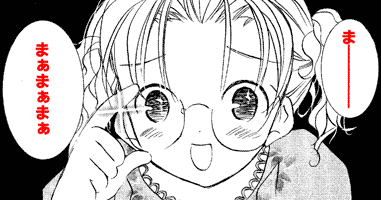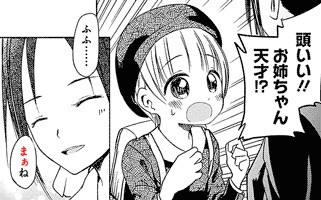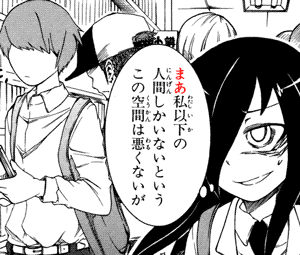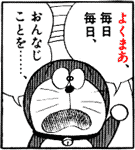Manga: Rozen Maiden ローゼンメイデン (Chapter 10)
As Interjection
As interjection, maa まぁ is used to express surprise or other feelings at something unexpected.For example: if an unexpected situation arises which you don't know to deal with, then:
- maa まぁ
Well...
When you meet someone you haven't seen in ages and you weren't expecting it:
- maa hisashiburi
まぁ久しぶり
Well, long time no see!
When someone says something or does something impolite, and you certainly didn't expect such lack of respect:
- maa shitsurei ne
まあ失礼ね
Wow, you aren't rude, aren't you?
When you're looking at something totally unexpected and amazing, or amusing, entertaining, etc.:
Manga: Rozen Maiden ローゼンメイデン (Chapter 10)
- maaaaa
まーーーー
Weeeell. - maa maa maa
まぁまぁまぁ
Well, well, well.- Wooooooow~~
- This. IS. AMAZING!!!1
- (or something like that.)
As Adverb
As adverb, maa まぁ goes before verbs in various ways. Most of them have to do with being unsure or uncertain about something, but still giving your opinion or doing something nonetheless. In a sense, maa is vaguely close to "I guess" in English.For example, maa can be used when you aren't exactly sure how to proceed, but "for starters," let's do this thing and then think about it in detail. It's used to recommend someone to do something.
- maa ocha demo douzo
まぁお茶でもどうぞ
Well, for now, [how about a cup of] tea?- douzo どうぞ
Used to offer someone something. "You may take it." - demo でも
Used when something may or mayn't be the case. In this case, whether the listener accepts the cup of tea or not is uncertain, but anyway: it's been offered.
- douzo どうぞ
This usage often shows up when the speaker is trying to pacify someone. The maa introduces the recommendation "to calm down."
- maa ochitsuite
まぁ落ち着いて
Well, for now, calm down.- After you calm down, we talk about it in detail.
The word maa まぁ can also be used when you're uncertain of whether you're about to do will succeed.
- maa yatte-miru ka
まぁやってみるか
Well, [I guess I'll try]?- Not sure it will work, though.
- yaru やる
To do. - -miru ~みる
To try [to do something]. (auxiliary verb.) - yatte-miru やってみる
To try to do [something].
The word maa まぁ can also be used to hesitantly express one's opinion:
- maa yameta hou ga ii
まぁやめたほうがいい
Erm, I guess you should stop.- yameru やめる
To give up. To stop [doing something].
- yameru やめる
Manga: Kaguya-sama wa Kokurasetai ~Tensai-Tachi no Ren'ai Zunousen~ かぐや様は告らせたい~天才たちの恋愛頭脳戦~ (Chapter 9)
- atama ii!!
頭いい!!
[Wow, you're so] smart!! - oneechan tensai!?
お姉ちゃん天才!?
[Are you] a genius, sis!? - fufu......
ふふ・・・・・・
*chuckle* - maa ne
まぁね
[Sort of].- I guess?
It can also be used when you think something doesn't matter, because you're about sure something will happen.
- maa kare ga katsu darou
まあ彼が勝つだろう
Well, he will win [anyway], won't he?
Or when the details don't matter, because the result is as it is: "well, in the end it turned out alright," and so on.
Manga: Black Lagoon (Chapter 4)
- maa
kore de,
ikken-rakuchaku
...tte
tokoro kashira.
まあこれで、一件落着・・・ってところかしら。
Well, [despite everything], I guess with this we could say one problem has been solved.- ikken-rakuchaku 一件落着
One issue solved. (four character idiom.) - tte tokoro? ってところ?
About where we may call it that?
Pretty much in a way where we may call it that.
The situation could pretty much be called "one issue solved"?
Practically, we could say it's solved? (etc.)
- ikken-rakuchaku 一件落着
The word maa まぁ can also be used when you aren't very satisfied with something, but you "guess that will do."
- maa ii ka
まぁいいか
I guess it's alright.- Also:
- Never mind that. That doesn't matter. Whatever. (when changing subject.)
- maa taoseru kedo
まぁ倒せるけど
Well, I guess I can defeat him, but... [it won't be easy.]- The speaker declares he has sufficient strength to defeat the enemy, in spite of whatever unexpected trouble he just came across.
- taoseru 倒せる
To be able to defeat.
(potential form of...) - taosu 倒す
To defeat. To win against. To best [someone in battle].
Manga: Watashi ga Motenai no wa Dou Kangaetemo Omaera ga Warui! 私がモテないのはどう考えてもお前らが悪い! (Chapter 4)
- Context: nerd girl likes place full of nerds.
- maaまあ
Well. - watashi ika no
ningen shika inai toiu
kono kuukan wa warukunai ga
私以下の
人間しかいないという
この空間は悪くないが
This space [in which]
[there's nobody better than me]
isn't bad, though.- Note she's saying it "isn't bad." She isn't saying "it's good." In other words, it's not something she really wants, but it will suffice.
- watashi ika no ningen
私以下の人間
Humans equal-or-below me.
Humans lesser than me.
People worse than me. - ...shika inai ~しかいない
There's nobody but... [humans lesser than me, in this place.] - ga が
But. However. Though.
The word maa まぁ can also replace mo も in yoku mo よくも, used when you're amazed at someone having done something but not exactly angry at them for doing it.
Manga: Doraemon ドラえもん (Chapter 71)
- yoku maa,
mai nichi mai nichi,
onnaji koto wo......
よくまあ、毎日毎日、おんなじことを・・・・・・
It's impressive, well, [that you keep doing] the same thing every day, every day......- This sentence doesn't have a verb, because the verb is implicit. We can guess the verb would be "to keep doing."
Further Reading
Related Posts
- maa maa まあまあ
An intensified maa まあ, which can be used to stop fights or to say something is neither good nor bad. - maa ii まあいい
A more detailed explanation of how maa ii means "whatever." - ojousama お嬢様
A type of character that say maa まぁ a lot.- It's their:
- kuchi-guse 口癖
"Mouth-habit." (literally.)
Something someone has an habit of saying. (like, people who say, like, "like," a lot of times, like, why? Like, you know?)
References
- まあの意味 - デジタル大辞泉 via dictionary.goo.ne.jp, accessed 2019-03-04.





No comments: